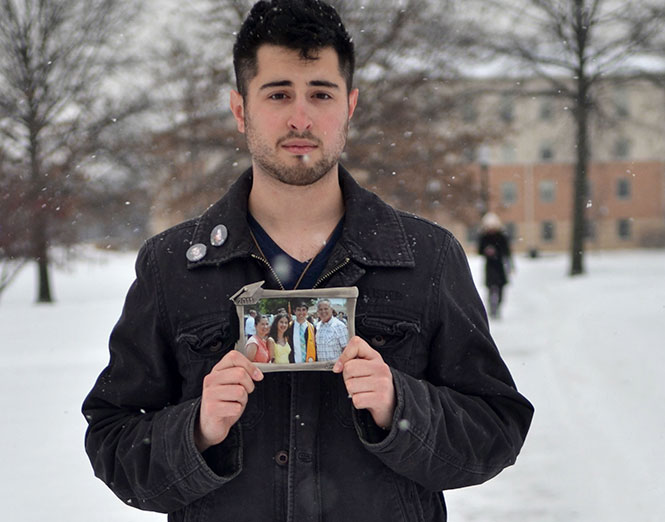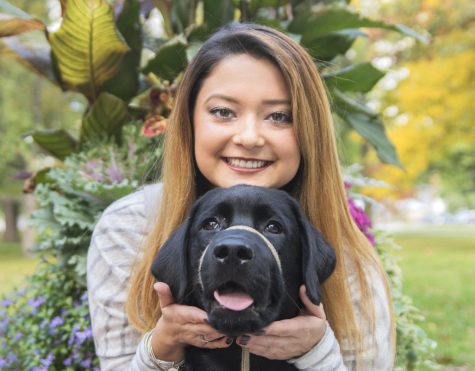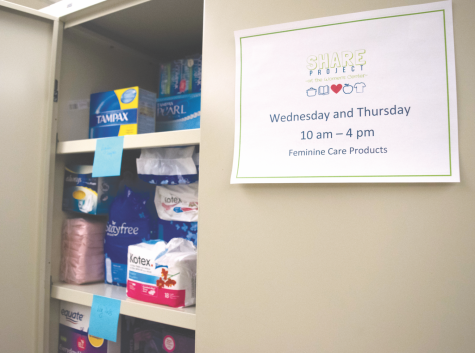Beating the homesick blues
Kent State junior, Michael Fisher, holds a photo of him and his family from his high school graduation. Michael lives in Long Island, N.Y. which prevents him from making frequent travels home.
February 5, 2014
Seven hours, 432 miles.
It’s a long way from home for Michael Fisher, a senior marketing major and Long Island native. Fisher makes up a small portion of the 11 percent of students who come from out-of-state.
“It was difficult, at first” said Fisher in regard to being so far away from home for the first time in his life. “My family and I are very close. It was difficult, because I didn’t talk to them for the first two weeks. I was adjusting and just getting myself into the whole college life situation.”
Fisher recalls when he did call home after those first two weeks, the phone only rang once before his parents picked up.
“The hard part was not seeing them as often as I wanted to, because I would come home every day from high school and talk to them, and I couldn’t,” he said.
Being in an unfamiliar place was also difficult. Being from New York, Fisher admits to knowing next to nothing about Ohio at the time, aside from Kent State and downtown Kent.
“I didn’t have a car to go anywhere, so I was kind of just stuck on campus, which was difficult,” Fisher said. “At home, I could drive wherever I wanted to. I could go wherever I wanted to on the island and knew where I was. It was fear of the unknown, I guess, not knowing what I was doing or where I was at any specific time.”
However, feeling homesick isn’t exclusive to out-of-state students. Michael Rosegarden, a sophomore computer information systems major, is from Covington, Ohio. Covington is 224 miles from Kent’s campus, which evens out to a three-and-a-half hour commute. For Rosegarden, it was a big change going from a small town to a big campus.
“I didn’t think I would get homesick,” Rosegarden said. “I figured I’d be too busy and be excited seeing a bigger and better world.”
For Rosegarden, the excitement of being in a new place wore off after two weeks of being on campus.
“Whenever I was feeling homesick, if it wasn’t late at night, I could call my parents and that would ease it,” Rosegarden said. “Plus, I would just think to myself, ‘Well, you’re going to be living on your own eventually, might as well get used to it.’”
Feeling homesick wasn’t the only new experience for Rosegarden.
“It was quite a culture shock coming from a tiny village of next to nobody,” Rosegarden said. “There were no racial differences. I remember walking on to campus before school started, and getting my textbooks and seeing all the different ethnicities on campus and just thinking, ‘Oh, my gosh.’ I couldn’t believe it.”
“But it’s really cool, actually getting out there in the world and seeing other people and other things, outside of the corn and tractors, and actually seeing what’s outside of a farming community,” Rosegarden said.
Transitioning from living at home to living on your own is difficult, and takes time. However, that doesn’t mean it’s near impossible. Jayita Datta, Clinical Psychologist with University Health Services, suggests getting involved and experiencing college life is the best way to adjust to being far away from home for an extended period of time.
“Be aware of things happening on campus,” Datta said. “Exercising and getting into a good schedule can also be a big motivator.”
Datta went on to add that an important part of starting a new life is having an open mind.
“It got a lot easier being with people I knew, knowing where I was and what I could do here. I just felt a lot safer and a lot more at home,” Fisher said.
His best advice?
“Just keep in touch with your family or friends you are close with back home. Don’t lose that,” he said. “Always find time to spend with your family, or find something here that will make you feel more at home.”
Contact Blythe Alspaugh at [email protected]
























